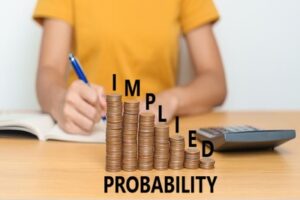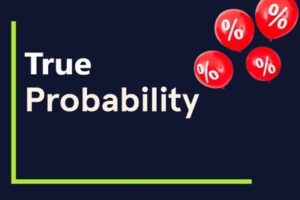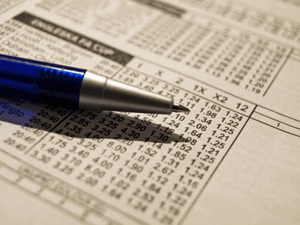 For many of us, betting is simply something that we enjoy as a leisure pursuit. We look at the odds offered by a bookie and see that as a reflection of the chances of that scenario occurring, we then choose whether to risk any money on that outcome in the form of a bet. Ultimately, though, bookies are private businesses that make money and they do that by building in margins into markets to ensure, if their book is balanced, that they will guarantee to make money whatever happens.
For many of us, betting is simply something that we enjoy as a leisure pursuit. We look at the odds offered by a bookie and see that as a reflection of the chances of that scenario occurring, we then choose whether to risk any money on that outcome in the form of a bet. Ultimately, though, bookies are private businesses that make money and they do that by building in margins into markets to ensure, if their book is balanced, that they will guarantee to make money whatever happens.
Therefore, when we look at betting odds we are looking at an implied probability that factors in an additional margin. Let’s say take a tennis game between two evenly matched players with odds of 10/11 on each to win, this gives each an implied probability of winning of 55%, adding those both together makes 110%, not 100%, and that additional 10% is the margin.
The true probability is the actual chances one scenario has of occurring over another and this will always add up to 100% when you take all outcomes into account. In the above example the true probability of each tennis player winning the match would be 50% and the odds would be evens (1/1). We can never know the true probability of an outcome happening but we can get fairly close using stats, research and knowledge. The idea is if the implied probability from the bookmaker is equal to or lower than the true probability that you’ve worked out then that market has potential value. Spotting these discrepancies is in effect how professionals make money when gambling, but it relies on a lot of hard work and number crunching to get close to what the true probabilities are.
An implied probability is effectively betting odds worked out as a percentage and knowing the implied and true probabilities isn’t just something professionals can use, using a bit of judgement and research can help anyone in spotting good and bad odds. Even if a bet is not in your favour if it is close to a true probability it may be worth backing, if, however, the implied probability is much higher and the margins for the bookie are high then perhaps avoid those bets. Employing that principle in general will likely mean you make better betting decisions overall.
Implied probabilities can drift from true probabilities for many reasons, not least that betting odds reflect risk rather than the actual chances of something happens. If a lot of money is staked on a specific outcome it has the effect of shortening those odds and lengthening those for the other outcomes, even though in reality the true probabilities have not changed. If you can work out when implied probabilities are lower than true probabilities it means there is a discrepancy in your favour, it doesn’t mean you will win the bet but it means if you always placed bets where the implied probability is higher than the true probability then over time you will benefit from those differences. This is known as backing markets with a positive expected value.
What is Implied Probability and True Probability?
 Implied probability is not something that solely applies to betting, but to many types of market-based transactions, too. If you engage in bonds and stock trading, futures, options, and so on, then implied probability comes into play in all these areas. With regard to sports betting though, it can be applied to various scenarios, regardless of whether you are placing bets on single events, futures, live sports bets, and more.
Implied probability is not something that solely applies to betting, but to many types of market-based transactions, too. If you engage in bonds and stock trading, futures, options, and so on, then implied probability comes into play in all these areas. With regard to sports betting though, it can be applied to various scenarios, regardless of whether you are placing bets on single events, futures, live sports bets, and more.
To put things simply, implied probability operates as a simple conversion of the traditional odds provided into a percentage. At the same time though, it also takes into consideration the house edge, and then eliminates that from the equation to express the odds in what is known as true odds (or true probability).
Probability is something that is used in many industries. Essentially it serves as a measure of how likely something is to happen, and when it comes to most sectors, it is usually expressed as a decimal between 0 and 1. The zero serves as impossibility and the 1 serves as certainty. Of course, in gambling, as noted before, it is often worked out as a percentage between 0% and 100%.
In many circumstances, probability can actually be calculated effectively enough in a simple way. If you toss a coin, there are only two possible outcomes for this – heads or tails – and this provides a 50% chance either way. Or if you roll a die, there are six potential outcomes for this, with all six numbers on the die being equally likely to be rolled. Yet when it comes to sports betting, probability is not so simple to calculate. This is because many factors can affect a sporting event, and while you can throw all the statistics at such that you want, you cannot determine a definite probability of a game or match.
Instead, you can simply calculate the chances of a particular outcome, and this is exactly the same for the bookmakers as well. This is how they provide odds at sportsbooks, although these cannot entirely be trusted as accurate representations of the probabilities included. After all, sports betting sites need to build a margin into the odds for themselves – that’s where their profit is!
It is possible to outdo the advantage of the sportsbooks, though. And this is where you get to utilise implied and true probability to potentially improve your betting odds.
Implied Probability Examples
 The best way to provide an insight into implied probability is with a couple of examples. As noted before, let’s start in a simple manner with the coin flip scenario. You and a friend are flipping the coin, and you both receive even money on a chosen side of it. You bet £100 per flip, and each time the coin lands heads-up, you win £100 in this scenario. In the same way, each time the coin lands tails-up, your friend wins £100. With a 50/50 chance of either side landing, for every £100 that you risk, you expect to get back 50% of £200 (your bet + your friend’s bet).
The best way to provide an insight into implied probability is with a couple of examples. As noted before, let’s start in a simple manner with the coin flip scenario. You and a friend are flipping the coin, and you both receive even money on a chosen side of it. You bet £100 per flip, and each time the coin lands heads-up, you win £100 in this scenario. In the same way, each time the coin lands tails-up, your friend wins £100. With a 50/50 chance of either side landing, for every £100 that you risk, you expect to get back 50% of £200 (your bet + your friend’s bet).
Turning to sports betting though, things get a little more complicated. The house edge means that the implied probability of the events will always add up to over 100%. And that extra percentage is the bookmaker’s expected profit.
Let’s say that you’re intending to place a bet on the Premier League game between Manchester United and Manchester City. You visit your favourite online sportsbook to place a wager and see that the odds for the event are:
- Manchester United: 7/2 (4.5)
- Manchester City: 4/6 (1.67)
These odds show a strong favourability for Manchester City to be the victor of the game. The probability behind these odds is what is known as the implied probability. For example, if you had a bet with odds of 3/1 (4.0), this equates to an implied probability of 25%. With that percentage, you can expect the bet to win one in every four attempts, so to speak. The formula for implied probability is very simple, and is as follows:
- Implied Probability = [Denominator / (Denominator + Numerator) x 100%
If you take the odds of 2/1 for example, the following equation will work – 1 ÷ (1 + 2) x 100 = 33.3%.
Using that on our previously spoken of football game between Man U and Man City, the equation is as follows:
- Manchester United: 2 ÷ (2 + 7) x 100 = 22.2%
- Manchester City: 6 ÷ (6 + 4) x 100 = 60%
Therefore, the implied probability of 60% for Man City provides an insight that they are more likely to win, according to the sportsbook where the odds came from. The only other part of the game to make mention of is the potential for a draw outcome. If our online sportsbook marks the odds as 3/1, then the draw outcome has an implied probability of 1 ÷ (1 + 3) x 100 = 25%. Adding those three percentages up – 22.2%, 60% and 25% – equates to a total of 107.2%. Our sportsbook therefore has a margin of 7.2% included in that.
There are already various online sites that incorporate odds convertor calculators complete with implied probability percentages attached. These are useful to incorporate into your betting strategy if you don’t want to do the implied probability calculations yourself. It is relatively easy to convert any odds to a percentage, whether they are fractional, decimal, American or an Asian format. However, while it is fairly easy to compute the implied odds and margins for simple markets like win-draw-win it is very hard for more complex markets like goalscorer bets.
In effect, the more the more complex a market it and the more possible outcomes there are the more conservative the bookies are and the higher their margins are in turn. I.e. match result markets tend to offer good betting value with low margins and complex markets like goalscorer bets are terrible value with high margins (hence why you see these bets pushed all the time in enhanced odds offers and what not).
What About True Probability?
 Utilising implied probability in your betting strategy is something that can give you an insight into how good value betting markets are based on how big the bookie margin is. Although this should not be taken as the actual probability, or the true odds, because the house edge is also included within that amount. You will need to look at how much money a wager is expected to award to you if you win it before anything else.
Utilising implied probability in your betting strategy is something that can give you an insight into how good value betting markets are based on how big the bookie margin is. Although this should not be taken as the actual probability, or the true odds, because the house edge is also included within that amount. You will need to look at how much money a wager is expected to award to you if you win it before anything else.
Let’s say that you wanted to place a bet on Manchester City to win, whose odds are 4/6. An implied probability of 60% has been worked out as noted above. If you wanted to place a £10 bet on the team to win at 4/6, then you can expect to receive a payout of £16.66 including your stake (£10 x 4 ÷ 6).
Of course, because the percentage incorporates the sportsbook’s edge, the actual probability (or true probability) will quite likely be less than this. Let’s say that the real probability of Manchester City winning is actually 55% at 4/6 odds. At the same time, their real probability of losing to a draw or a Man Utd win stands at 45% in this scenario.
In this respect, you need the following calculation:
(Amount you win per wager x probability of winning) – (stake x probability of losing)
In our example, the expected value of a 55% actual probability Man City win at 4/6 is calculated as follows:
(£6.66 x 55%) £3.66 – (£10 x 45%) £4.50 = -£0.84
In this example, your bet on Manchester City would have a negative expected value, so in the long run, you could only expect money to be lost from wagering on such markets. What determines the quality of your predictions is actually the real value. Should you proceed with placing a bet with an expected value of less than zero, you should prepare yourself to lose, because it has low quality. Even if you managed to get it right for a short period of the time, it would still mean a loss of funds in the grand scheme of things. It is for this reason that it is always advisable to place wagers with a positive expected value should you be looking at making high-quality predictions. You can read more about expected value and variance here.
Let’s take an alternative true probability just as an example. Let’s say that Man City’s true probability of winning is actually 70%, leaving a 30% chance of a draw or Man United win, this would play out in the following way:
(£6.66 x 70%) £4.66 – (£10 x 30%) £3 = £1.66
This time, the calculations provided a positive outcome of £1.66. This makes it a much higher quality prediction.
What to Take from This
 It is always important to remember that the odds suggested by an online sportsbook are not always reflective of the real probability when it comes to a particular outcome and its accuracy. Other factors may have influenced the bookie’s odds, and of course, it is always possible for sportsbooks to make mistakes. It is always ideal to measure the value of a bet before you place it, just to determine whether or not it is actually worth you proceeding with it or not. If you practice this while you bet then you might not necessarily win in the long run, it all depends on how good your predication of true odds is, but ultimately if you try to find betting value then at least you may not lose as much over time.
It is always important to remember that the odds suggested by an online sportsbook are not always reflective of the real probability when it comes to a particular outcome and its accuracy. Other factors may have influenced the bookie’s odds, and of course, it is always possible for sportsbooks to make mistakes. It is always ideal to measure the value of a bet before you place it, just to determine whether or not it is actually worth you proceeding with it or not. If you practice this while you bet then you might not necessarily win in the long run, it all depends on how good your predication of true odds is, but ultimately if you try to find betting value then at least you may not lose as much over time.
At the same time, you should never rely on implied probability, true odds or expected value as being a guaranteed strategy for success. The theory is that you should be able to make a profit in the grand scheme of things, as long as you are making bets that offer a positive expected value. But anything can happen in the world of sports betting, so you cannot place all of your hopes in one basket. Mathematics can reveal certain aspects of engaging in sports wagering, but they cannot be held accountable for providing you with a positive outcome from a bet each time.
If you take yourself seriously as a sports bettor, then you will likely already have a strategy in place to put to use. But if the prime aspect of this strategy is not seeking out value, then it will ultimately fail. A good way of incorporating implied probability and expected value into your strategy is to:
- Decide upon the likeliness of an event occurring. Utilise statistics, tactical analysis, knowledge and so on to find out more about the potential likelihood of one outcome or another occurring.
- Compare your own analysis with that of the online sportsbooks to see how likely they think it will come to fruition.
- If you believe that an event is more likely to happen than what a bookmaker is implying via their odds, you could have come across a value bet.
- Do a couple of calculations as displayed and if you have located a value bet, then it’s a good idea to place a bet on it. It might not necessarily win but that doesn’t make it a bad bet, stick to this principle and overall it will provide value.
Any betting strategy or system should really include you calculating the implied probability from the bookmaker’s odds and then seeking out the value of proceeding with such a wager. If you’re a serious bettor, then this will already have factored into your own strategy.
The Final Word on Implied and True Probability
To answer the original question asked, implied probability is the percentage chance that a bet is expected to win. Meanwhile, true probability is this same figure but without the house edge included in the overall total. This, naturally, makes it a lot closer to what the actual percentage of winning is. And as noted, while this is something that should be included in any ideal gambling strategy, it should never be 100% relied upon to provide a guaranteed payout.